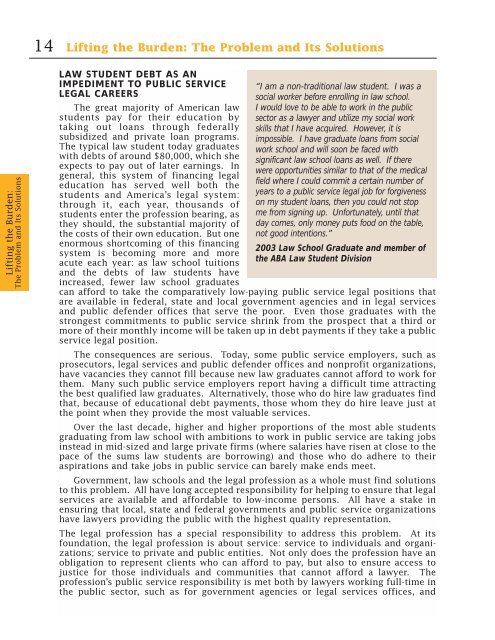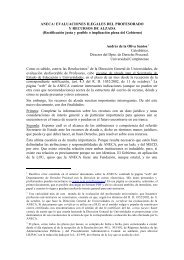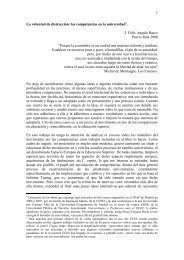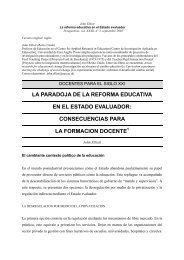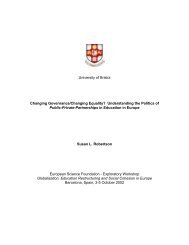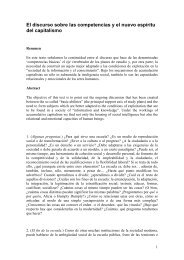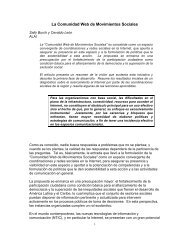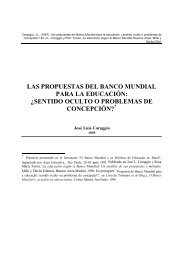Lifting the Burden: Law Student Debt as a Barrier to Public Service
Lifting the Burden: Law Student Debt as a Barrier to Public Service
Lifting the Burden: Law Student Debt as a Barrier to Public Service
Create successful ePaper yourself
Turn your PDF publications into a flip-book with our unique Google optimized e-Paper software.
14<strong>Lifting</strong> <strong>the</strong> <strong>Burden</strong>: The Problem and Its Solutions<strong>Lifting</strong> <strong>the</strong> <strong>Burden</strong>:The Problem and Its SolutionsLAW STUDENT DEBT AS ANIMPEDIMENT TO PUBLIC SERVICELEGAL CAREERSThe great majority of American lawstudents pay for <strong>the</strong>ir education bytaking out loans through federallysubsidized and private loan programs.The typical law student <strong>to</strong>day graduateswith debts of around $80,000, which sheexpects <strong>to</strong> pay out of later earnings. Ingeneral, this system of financing legaleducation h<strong>as</strong> served well both <strong>the</strong>students and America’s legal system:through it, each year, thousands ofstudents enter <strong>the</strong> profession bearing, <strong>as</strong><strong>the</strong>y should, <strong>the</strong> substantial majority of<strong>the</strong> costs of <strong>the</strong>ir own education. But oneenormous shortcoming of this financing“I am a non-traditional law student. I w<strong>as</strong> <strong>as</strong>ocial worker before enrolling in law school.I would love <strong>to</strong> be able <strong>to</strong> work in <strong>the</strong> publicsec<strong>to</strong>r <strong>as</strong> a lawyer and utilize my social workskills that I have acquired. However, it isimpossible. I have graduate loans from socialwork school and will soon be faced withsignificant law school loans <strong>as</strong> well. If <strong>the</strong>rewere opportunities similar <strong>to</strong> that of <strong>the</strong> medicalfield where I could commit a certain number ofyears <strong>to</strong> a public service legal job for forgivenesson my student loans, <strong>the</strong>n you could not s<strong>to</strong>pme from signing up. Unfortunately, until thatday comes, only money puts food on <strong>the</strong> table,not good intentions.”2003 <strong>Law</strong> School Graduate and member of<strong>the</strong> ABA <strong>Law</strong> <strong>Student</strong> Divisionsystem is becoming more and moreacute each year: <strong>as</strong> law school tuitionsand <strong>the</strong> debts of law students haveincre<strong>as</strong>ed, fewer law school graduatescan afford <strong>to</strong> take <strong>the</strong> comparatively low-paying public service legal positions thatare available in federal, state and local government agencies and in legal servicesand public defender offices that serve <strong>the</strong> poor. Even those graduates with <strong>the</strong>strongest commitments <strong>to</strong> public service shrink from <strong>the</strong> prospect that a third ormore of <strong>the</strong>ir monthly income will be taken up in debt payments if <strong>the</strong>y take a publicservice legal position.The consequences are serious. Today, some public service employers, such <strong>as</strong>prosecu<strong>to</strong>rs, legal services and public defender offices and nonprofit organizations,have vacancies <strong>the</strong>y cannot fill because new law graduates cannot afford <strong>to</strong> work for<strong>the</strong>m. Many such public service employers report having a difficult time attracting<strong>the</strong> best qualified law graduates. Alternatively, those who do hire law graduates findthat, because of educational debt payments, those whom <strong>the</strong>y do hire leave just at<strong>the</strong> point when <strong>the</strong>y provide <strong>the</strong> most valuable services.Over <strong>the</strong> l<strong>as</strong>t decade, higher and higher proportions of <strong>the</strong> most able studentsgraduating from law school with ambitions <strong>to</strong> work in public service are taking jobsinstead in mid-sized and large private firms (where salaries have risen at close <strong>to</strong> <strong>the</strong>pace of <strong>the</strong> sums law students are borrowing) and those who do adhere <strong>to</strong> <strong>the</strong>ir<strong>as</strong>pirations and take jobs in public service can barely make ends meet.Government, law schools and <strong>the</strong> legal profession <strong>as</strong> a whole must find solutions<strong>to</strong> this problem. All have long accepted responsibility for helping <strong>to</strong> ensure that legalservices are available and affordable <strong>to</strong> low-income persons. All have a stake inensuring that local, state and federal governments and public service organizationshave lawyers providing <strong>the</strong> public with <strong>the</strong> highest quality representation.The legal profession h<strong>as</strong> a special responsibility <strong>to</strong> address this problem. At itsfoundation, <strong>the</strong> legal profession is about service: service <strong>to</strong> individuals and organizations;service <strong>to</strong> private and public entities. Not only does <strong>the</strong> profession have anobligation <strong>to</strong> represent clients who can afford <strong>to</strong> pay, but also <strong>to</strong> ensure access <strong>to</strong>justice for those individuals and communities that cannot afford a lawyer. Theprofession’s public service responsibility is met both by lawyers working full-time in<strong>the</strong> public sec<strong>to</strong>r, such <strong>as</strong> for government agencies or legal services offices, and


